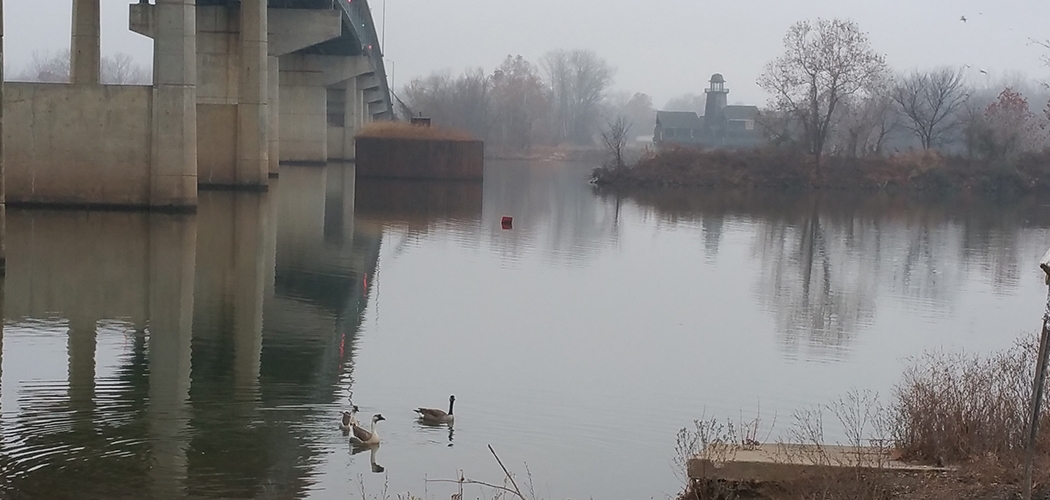[title subtitle=”words: Marla Cantrell”][/title]
The Arkansas River, at least where Liddie lives, is not the world’s most beautiful waterway, but she still goes to the grounds of the National Historic Site in Fort Smith to see it when the weather’s nice. There’s a spot where you can sit and watch the water churning below, where you can see the power of the river, the power of anything that bands together the way this water does, millions of drops gathered in this one place.
Today is cold, the sky burdened with clouds. Christmas was just three weeks ago, with its sugar cookies and spiked punch, and Liddie took as much as she could of it, knowing January was headed her way.
She has friends born in January. All of them are headstrong and beautiful. All of them seem to know the right thing to do, all the time. Not Liddie. She’s rarely sure. All she knows today is that she doesn’t want to go home.
So she drives instead. She pushes through Barling, then takes her SUV across the River Bottoms where the road curves, a belly dancer covered in blacktop. She crosses the bridge, notices this section of the Arkansas River that slaps against the lock and dam. She had a high school friend drown not far from there, fifteen years ago. She can still see his face, his hair more red than brown. Bruce. Twenty-one when he died. She can still see him copying her answers in their sophomore science class. In all living things, the basic unit of life is the ____.
The answer is cell. Just one and you don’t have much. Take thirty-seven trillion and you could make a person.
The road takes her to Van Buren, and she heads downtown. There’s a bookshop across from the depot she adores. Chapters On Main. They sell the best coffee. She steps inside, orders her drink, browses the shelves.
At the end of Main Street, the Arkansas River shows up again. She used to go there as a kid and stand on the dock. A school of carp hung near the shore, waited for bread crumbs and crackers that visitors brought as often as the sun came up. She remembers the fishes’ smart silvery bodies, jumping from the water to grab the food. Maybe school is not the right word. She smiles at her cleverness. A university of carp, she thinks. That’s more accurate.
Once, when she was eleven, she snatched communion wafers from her church’s pantry to feed the fish. She’s never gotten over it. That awful theft. That sacrilege. “Well,” she says aloud. “You can’t go back.”
There’s a woman browsing the shelves nearby. She is easily seventy years old. She is dressed in a long denim skirt, thick brown socks, fur-lined boots. She has more rings than fingers. She has silver hair that tumbles across her shoulders. She wears red lipstick and fake eyelashes and turquoise beads.
The woman steps closer, puts two fingers behind her ear. “Excuse me?”
Liddie, startled, says, “Sorry! Just talking to myself.”
The woman holds out her hand, “CJ,” she says, as a form of introduction. “Nice to meet you. And no worries about talking to yourself. All the best people do.”
The two women talk books. They both love Joan Didion, Elizabeth Berg, Liane Moriarty, Barbara Kingsolver. They disagree on David Sedaris and John Grisham.
When Liddie’s coffee is ready, the women sit together at one of the tables. A sound system pumps in smooth jazz, the smell of coffee a shawl around them.
“I’ve never met anyone who reads that I didn’t like,” CJ says. “They seem to be able to describe what they’re feeling, which is a highly unrated skill.”
When Liddie was a senior in high school, she went to hear a poet read. Her voice was like CJ’s, all bells and flutes and enunciated words. Liddie fell under her spell. When the reading was over, she couldn’t tell you one line the poet recited, yet she felt as if she understood every stanza.
She considers CJ’s comment about feelings. “I’ve been feeling like I don’t want to go home,” Liddie says.
“Why is that?”
Liddie looks at her coffee. “My husband left me the first week of October. And then he came back at Christmas.”
Liddie holds up her right hand and shows the diamond ring that sparkles on her finger. “He bought me this,” she says.
“My,” CJ says, “such a lovely trinket.”
“Right. I mean about it being a trinket. Anyway, he’s not the same. He wears this new cologne that has undertones of black pepper, I’m not even kidding, and I think, Who bought you that?”
“But he came home to you, Liddie.”
“I know, and I should feel like I won a prize, right?” Liddie looks around and then leans in. “But I don’t.”
CJ wraps her fingers around her cup. “My ex-husband’s name is Robert, but I called him Robbie. My rightful name is Clara Jane, but he called me CJ. We lived in a two-story house in the Historic District in Fort Smith.” She shakes her head. “The work those old houses take. But we loved it, every sloping floor and every rattling pipe. We poured our money into it, like cream into coffee.
“It wore us down after a while. And then it tore us down. Robbie lives in Muskogee now, in a modern house that doesn’t demand a thing from him, with a woman who, as I understand it, demands everything.”
“And your old house?”
CJ laughs. “It’s a lawyer’s office now. A divorce attorney!”
The front door opens, a little bell ringing when it does. A youngish woman, not too much older than Liddie, walks in with three little ones tagging behind her. The youngest child, a girl in a red velvet coat, wipes her nose with her white mitten.
“Where do you live now?” Liddie asks, and CJ tells her she has an apartment a few blocks away.
CJ’s face brightens, and she claps her hands. “Come see it!” she says.
CJ’s apartment smells like patchouli and just-baked bread. Silk scarves drape the lamps in the small living room, and bookshelves line the walls. There is a sign above the kitchen table that reads, “Earth’s Crammed with Heaven – Elizabeth Barrett Browning.” And in the china hutch, tiny origami cranes rest, made from bits of wrapping paper, so many it’s impossible to count.
“What’s the deal with the cranes?” Liddie asks, and CJ tells her the Japanese legend. How you fold a thousand for yourself or someone in need. “They make wishes come true,” she says, her chin raised, as if she’s expecting Liddie to refute the claim.
Liddie looks at the older woman’s knobby fingers, wondering how she makes those intricate folds, over and over again.
“What’s your wish?” Liddie asks, and CJ says, “These aren’t for me. I’ve been waiting for the right person to give them to. And today I decided. These are yours. All you have to do is tell me what you want.”
Before Liddie can say a word, CJ goes to the kitchen to make lunch. There’s something healing about having someone cook for you, and Liddie sits in the velvet chair in the living room, listening to CJ work.
After the grilled cheese sandwiches are ready, Liddie learns that the cranes take CJ about five minutes each to make. Liddie thinks, Five minutes times a thousand. Such a lot of time.
CJ breaks Liddie’s concentration. “So,” she says, “what’s your wish?”
Liddie realizes that her husband hasn’t asked her that question in a long time. Not when he moved out, and not when he moved back in. “I don’t know. A say in how my own life turns out, maybe. A little bit of control over my future.”
CJ listens, mentioning three books that might help. And then she says, “Sorry about the recommendations. Kind of a habit. You read so much, you think you can solve all the world’s problems. But this is about you and the cranes. If you want to take your life back, then that’s your wish.”
Liddie’s pulse quickens. “What happens now?”
CJ says, “Well, you could take the cranes home, spread them across your house. Or, you could release them. Some people let them float away in a stream or lake.”
“Or a river?”
“Sure,” CJ says. “Why not?”
The Arkansas is only a few blocks from where they are now. They gather the cranes in grocery sacks and head out. Liddie holds CJ’s arm when they get near the water, leading her down the slope to the soggy bank. A light mist is falling, and the sun is nowhere in sight.
Liddie kneels on the wet ground. She takes a handful of the cranes, some glossy pink, some made of Christmas paper, some a small violet print, and drops them in the water. They bob on the surface, they float and float, as Liddie scoops up more of the birds and lets them fall.
They look like little flowers on the surface of the water. Liddie thinks about the night her husband left, how she blocked the bedroom door and wailed as he moved her aside and walked past her. Her cheeks burn at the thought.
And then she thinks of her old friend Bruce. The last day she saw him, she’d been working at the Sonic, just yards from where she is now. When she’d taken him his food, he’d told her he’d just gotten a job at the Housing Authority, patching up empty apartments. He said, “I freaking love my life.”
Liddie wants to love her life. Wants to wake up eager to see what the day will bring. She stands up straighter, watches the thousand cranes ride the choppy river.
CJ has made her way to Liddie’s side, and she slips her arm around Liddie’s waist. The grocery bags are empty now, and the cranes are now beginning to sink. “My university of cranes,” Liddie says.
“Your university of cranes,” CJ repeats. “Oh, how I love that.”
In the weeks to come, Liddie will move her husband into the guest bedroom. She will take a hammer to his bottle of cologne, and he will never ask where it went. She will change her hair, her diet, her daily routine. She will start a book club with CJ. She will start taking yoga, will start reading books about meditation. Will start folding cranes.
Her husband will feel the churning of a man suddenly unsure of his life. By spring, he will realize that he wants to stand in Liddie’s wonder for as long as he can. He just hopes that she’ll let him. He’ll do anything if she’ll only let him.




